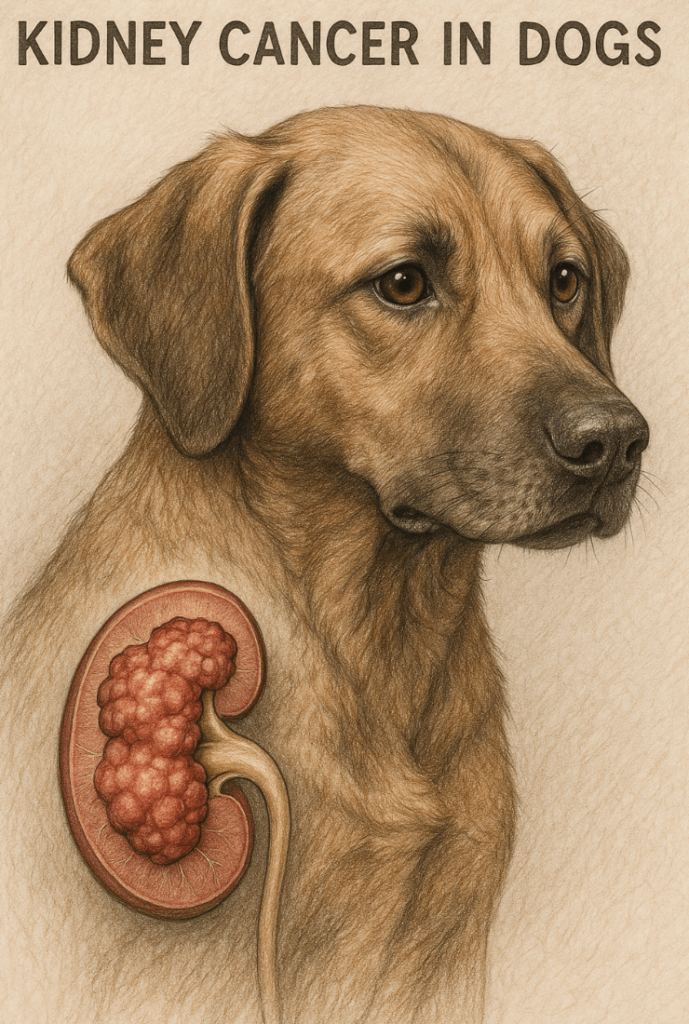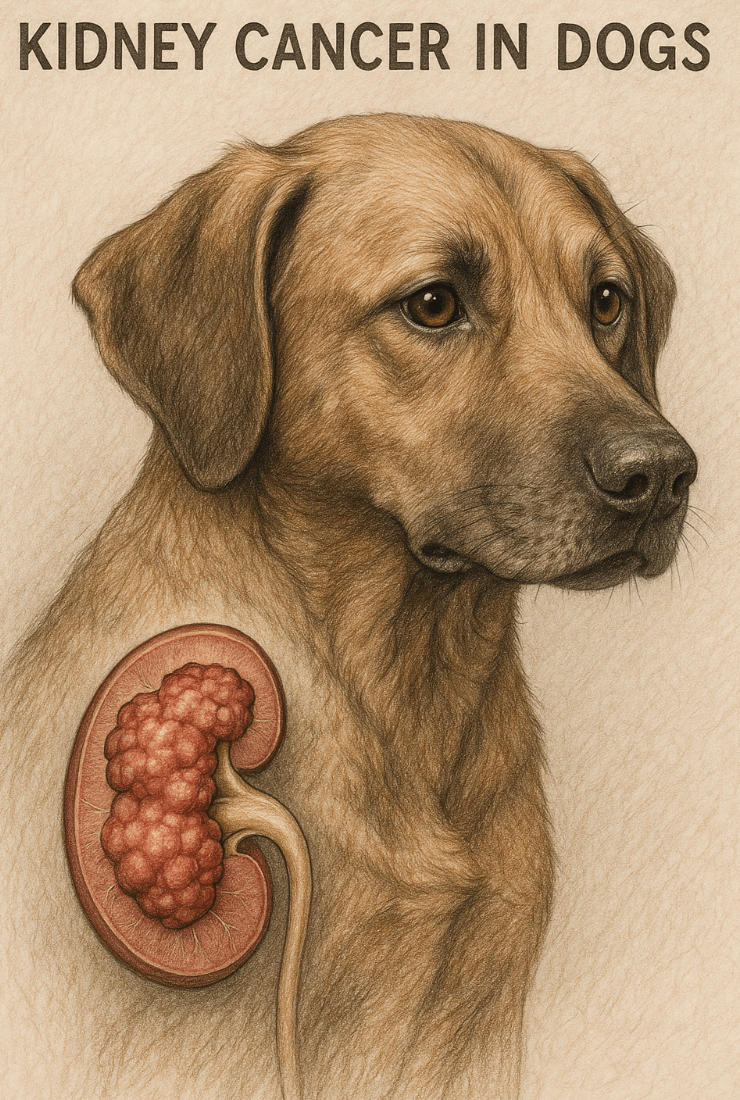Kidney Cancer in Dogs: Understanding the Condition and Its Impact
Kidney cancer in dogs is a rare but serious condition that can significantly affect their quality of life. While cancers affecting other organs are more commonly diagnosed, kidney tumors—though less frequent—require careful attention due to their potential to spread or impair vital functions. Early detection and proper management are key to ensuring your dog receives the best possible care.
This blog post explores the causes, symptoms, diagnosis, and treatment options for kidney cancer in dogs, as well as tips for supporting your furry companion through this challenging time. Whether you’re a concerned pet owner or simply seeking knowledge, understanding this condition can help you make informed decisions about your dog’s health.
Signs and Symptoms of Kidney Cancer in Dogs
Recognizing the signs of kidney cancer early can make a significant difference in your dog’s prognosis. While some symptoms may overlap with other kidney-related issues, persistent or severe symptoms should prompt a visit to the veterinarian.
Increased Thirst and Urination:
Dogs with kidney cancer often drink more water and urinate excessively due to compromised kidney function.Weight Loss and Appetite Changes:
Unexplained weight loss or a sudden refusal to eat can indicate underlying health issues, including cancer.Lethargy and Weakness:
A noticeable decline in energy levels or reluctance to engage in physical activities may signal kidney problems.Vomiting or Diarrhea:
Digestive upset, including vomiting or diarrhea, can occur as toxins build up in the body due to impaired kidneys.Abdominal Swelling or Pain:
Tumors in the kidneys may cause visible swelling or discomfort when the abdomen is touched.
If your dog exhibits any combination of these symptoms, it’s crucial to consult a veterinarian promptly for a thorough evaluation.
Causes and Risk Factors for Kidney Cancer in Dogs
While the exact cause of kidney cancer in dogs remains unclear, certain factors may increase a dog’s susceptibility to developing this condition. Understanding these risk factors can help owners take preventive measures where possible.
Age and Breed Predisposition:
Older dogs and certain breeds, such as German Shepherds and Golden Retrievers, are at higher risk for kidney cancer.Genetic Factors:
Some dogs may inherit a predisposition to kidney tumors, making regular check-ups essential for early detection.Environmental Toxins:
Exposure to harmful chemicals, pesticides, or contaminated water sources can contribute to kidney damage over time.Chronic Kidney Disease (CKD):
Dogs with pre-existing kidney conditions are more vulnerable to developing cancerous growths in the kidneys.Poor Diet and Nutrition:
A diet lacking in essential nutrients or high in processed ingredients may weaken kidney health over time.
By addressing these factors proactively, you can reduce your dog’s risk of developing kidney cancer and promote overall well-being.
Check this guide 👉Dog Cancer Diet: Best 7 Expert Tips!
Check this guide 👉Bladder Cancer in Dogs: Best 7 Expert Tips!
Check this guide 👉Spleen Cancer in Dogs: Best 7 Expert Tips!

Common Symptoms of Kidney Cancer | Diagnostic Tools Used by Veterinarians |
|---|---|
Increased thirst and urination | Blood tests to assess kidney function |
Weight loss and appetite changes | Urinalysis to detect abnormalities |
Lethargy and weakness | Ultrasound imaging to identify tumors |
Vomiting or diarrhea | Biopsy for definitive cancer diagnosis |
Abdominal swelling or pain | X-rays to evaluate internal structures |
Treatment Options for Kidney Cancer in Dogs
Once diagnosed, treatment for kidney cancer in dogs depends on the type, size, and stage of the tumor, as well as the dog’s overall health. Here are some common approaches veterinarians may recommend.
Surgical Removal of Tumors:
If the tumor is localized and accessible, surgery may be performed to remove it and preserve kidney function.Chemotherapy:
Chemotherapy is often used for malignant tumors that have spread beyond the kidneys to other parts of the body.Radiation Therapy:
Targeted radiation can shrink tumors and alleviate symptoms, though it’s less commonly used due to its cost and availability.Medications for Symptom Management:
Drugs may be prescribed to manage pain, nausea, or other side effects caused by kidney dysfunction.Dietary Adjustments:
A specialized renal diet low in protein and phosphorus can support kidney health and improve quality of life.
Each treatment plan is tailored to the individual dog, emphasizing both extending life expectancy and maintaining comfort.
How to Support Your Dog During Treatment
Caring for a dog with kidney cancer requires patience, dedication, and a focus on enhancing their quality of life. Here are practical ways to support your furry friend during this challenging journey.
Provide a Comfortable Environment:
Ensure your dog has a quiet, cozy space to rest and recover without unnecessary stress.Monitor Their Diet Carefully:
Follow your veterinarian’s dietary recommendations to minimize strain on the kidneys and maintain nutritional balance.Administer Medications as Directed:
Stick to prescribed medication schedules to manage symptoms effectively and prevent complications.Schedule Regular Vet Visits:
Frequent check-ups allow your veterinarian to monitor progress and adjust the treatment plan as needed.Offer Emotional Support:
Spend quality time with your dog, offering affection and reassurance to boost their spirits and strengthen your bond.
By prioritizing your dog’s physical and emotional needs, you can help them navigate this difficult period with dignity and love.
Tips for Managing Daily Life with a Dog Undergoing Treatment
Caring for a dog undergoing treatment for kidney cancer requires adjustments to daily routines. These tips can help streamline the process and improve your dog’s experience.
Create a Consistent Schedule:
Establishing a predictable routine for feeding, medication, and rest reduces stress for both you and your dog.Keep Track of Symptoms:
Maintain a journal to document changes in behavior, appetite, or energy levels, which can help your vet tailor treatments.Make Hydration a Priority:
Encourage water intake by providing fresh, clean water at all times or using flavored broths to entice drinking.Limit Physical Activity:
Avoid strenuous exercise to prevent fatigue and allow your dog’s body to focus on healing.Stay Positive and Patient:
Your attitude influences your dog’s mood—remaining calm and optimistic creates a supportive environment.
With these strategies, you can create a nurturing atmosphere that promotes recovery and well-being.
Holistic Approaches to Complement Traditional Treatments
In addition to conventional treatments, holistic therapies can enhance your dog’s quality of life and support kidney health. Always consult your vet before trying new methods.
Herbal Supplements:
Certain herbs, like milk thistle, may aid liver and kidney detoxification processes when used under veterinary supervision.Acupuncture Sessions:
Acupuncture can help alleviate pain, improve circulation, and stimulate the immune system naturally.Massage Therapy:
Gentle massage relaxes muscles, reduces stress, and enhances lymphatic drainage, benefiting overall health.Hydrotherapy Exercises:
Low-impact water exercises strengthen muscles and joints without putting additional strain on the body.Mindfulness Practices:
Techniques like Reiki or meditation can promote relaxation and foster a deeper connection between you and your dog.
Integrating these approaches can complement traditional treatments and provide comprehensive care.
Understanding the Emotional Toll on Pet Owners
Caring for a dog with kidney cancer not only affects the pet but also takes an emotional toll on the owner. Acknowledging and addressing these feelings is essential for coping effectively.
Grief and Anxiety:
The uncertainty of the situation can trigger feelings of grief and anxiety about the future. Allow yourself to process these emotions openly.Guilt Over Decisions:
Owners may feel guilty about treatment choices or worry they aren’t doing enough. Trust that you’re making the best decisions based on available information.Financial Stress:
Veterinary bills for cancer treatment can be overwhelming. Explore payment plans, pet insurance, or fundraising options to ease the burden.Isolation from Social Support:
Friends or family may not fully understand what you’re going through. Seek out online communities or local groups for emotional support.Celebrating Small Wins:
Focus on joyful moments and celebrate milestones, no matter how small, to maintain hope and positivity.
By acknowledging these challenges, you can find strength and resilience while continuing to provide loving care for your dog.
Frequently Asked Questions About Kidney Cancer in Dogs
What is the survival rate for dogs with kidney cancer?
Survival rates vary depending on the type of tumor, treatment options, and the dog’s overall health. Early intervention improves outcomes.
Can kidney cancer be cured in dogs?
In some cases, surgical removal of localized tumors can lead to remission, but malignant cancers often require ongoing management.
How is kidney cancer diagnosed?
Diagnosis typically involves blood tests, urine analysis, imaging (ultrasound or X-rays), and sometimes a biopsy.
Are certain breeds more prone to kidney cancer?
Yes, breeds like German Shepherds and Golden Retrievers have a higher incidence of kidney tumors.
What can I do to prevent kidney cancer in my dog?
While prevention isn’t always possible, maintaining a healthy lifestyle, avoiding toxins, and scheduling regular vet visits can reduce risks.
Empowering Yourself to Care for a Dog with Kidney Cancer
Kidney cancer in dogs is undoubtedly a challenging diagnosis, but with the right knowledge and resources, you can provide your beloved companion with the care they need. From recognizing early symptoms to exploring treatment options and offering unwavering support, every step you take makes a difference. Remember, your veterinarian is your greatest ally in managing this condition, so don’t hesitate to seek professional advice whenever needed. By staying informed and compassionate, you can ensure your dog lives their remaining days with comfort, love, and dignity.
Do Cats Have Taste Buds? Best 7 Expert Tips! – Discover how cats experience flavors and why their taste is so unique.
Do Dogs Have Taste Buds? Best 7 Expert Tips! – Discover how dogs experience taste, their preferences, and what it means for their diet and health.
Can Cats Taste Sweet? Best 7 Expert Tips! – Discover why cats can’t taste sweetness, how it affects their diet, and tips to keep them healthy and happy.
Can Dogs Taste Sweet? Best 7 Expert Tips! – Discover how dogs perceive sweetness, which foods are safe, and tips to manage their sweet cravings responsibly.





